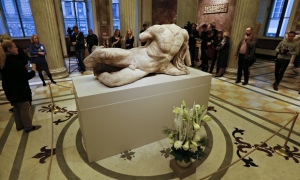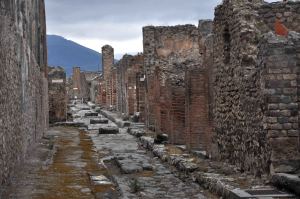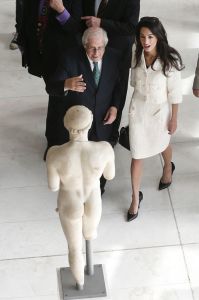I was sorry to hear earlier this week that Chris Price had passed away at the age of 83.
For those who didn’t know him, Chris was a former Labour politician, who worked tirelessly for many years in support of the return of the Parthenon Sculptures to Greece. He studied classics at Oxford and expressed his views on the Elgin Marbles (as they were then known) to colleagues as early as 1958. This is interesting, as many retentionists like to believe that any movements for return only originated when Melina Mercouri became Culture Minister in Greece in the 1980s, whereas the reality is that the return movement has always existed.
Chris was one of the original members of the British Committee for the Reunification of the Parthenon Marbles, and its Deputy Chairman for many years. He was also a member of Marbles Reunited, liaising between the two committees. He was also a great philhellene and critic of the Turkish invasion of Northern Cyprus. Unlike many of today’s politicians, he was a man of substance and conviction – somebody who would do what he believed to be right, rather than perpetually worrying about whether this would damage his chances of being re-elected.
After leaving parliament following electoral defeat in 1983, he went on to become the vice-chancellor of Leeds Polytechnic during its transition to becoming a university, part of his lifelong commitment for a fairer and more equal society and the importance of educational opportunity. Once he retired had more time available to devote to the restitution of the Parthenon Sculptures, regularly using his parliamentary contacts and in-depth knowledge of government procedures to secure meetings, discover about new bills that were going to be debated and otherwise intervene, to make sure that the opinion of those supporting reunification of the sculptures was heard.
He enriched the lives of all of us who were lucky enough to have known him, and his expertise will be missed by all who campaign for the return of the Parthenon Sculptures. While others might have pre-conceived ideas of how the campaign should be managed, Chris was always open to adapting strategies and incorporating new approaches, in order to accommodate changing conditions. When I last met with him in 2010, he was enthusiastically talking to me about the idea of cultural decolonisation – the idea that Britain had decolonised physically, but never bothered to send back the cultural artefacts when she granted independence & that this was a widespread movement that needed to happen.
Chris died last Saturday 20th February 2015, after a period of poor health following a stroke.

Christopher Price, Deputy Chairman of the BCRPM
From:
Independent
Christopher Price: Energetic MP who despite his combative nature was liked and admired both by colleagues and opponents
Tam Dalyell
Tuesday 24 February 2015
It was Christopher Price’s misfortune – and in my informed opinion the nation’s – that he never held a safe Labour seat. In 1966 he took Birmingham Perry Barr from the Conservative incumbent Dr Wyndham Davies but perished when Edward Heath came to power in 1970. In February 1974 he was elected to Lewisham West, and held the seat in 1979, but to the huge sadness of his many Labour friends – he had the rare gift in politics of being candid and outspoken without making enemies – he lost by a sliver in the 1983 election at which Gerald Kaufman described Labour’s manifesto as “the longest suicide note in history”.
Had Price survived he would certainly have been elected to the Shadow Cabinet, and might well have been elected leader rather than Neil Kinnock; he would have garnered votes from a number of colleagues. His eventual successor in Perry Barr, Jeff Rooker, then a young engineering manager, told me Price had been well-regarded by the Birmingham Labour councillors and local union leaders. Jill Knight (Edgbaston) remembered him as a first class colleague on City of Birmingham supra-party issues. Brian Walden, elected in 1964 for Birmingham all Saints, told me, “Chris Price was a very, very good constituency MP. He genuinely cared about people, not least those from ethnic minorities. I have nothing adverse to say about him.” Coming from the most acerbic TV inquisitor of our age, that last sentence is an accolade.
Read the rest of this entry »










